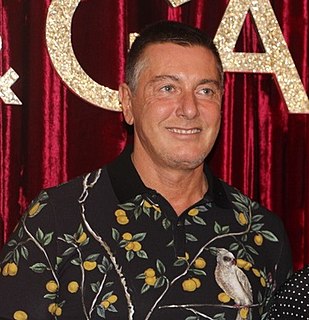A Quote by Harrison Ford
The thing I always guard against when I'm talking to people I'm working with about a script is that there's a thing I don't like and it's called "talk story." It's when you're talking about the story; the characters are tasked with talking about the story instead of allowing the audience to experience the story.
Related Quotes
Alison [McGhee] and I have known each other since the summer of 2001. One evening we were sitting around talking about how we wished we had a good story to work on. Alison said: Why don't we work on a story together? I said: A story about what? And Alison said: A story about a short girl and a tall girl.
I never talked about homosexuality with my family. After I was 18, they know everything, but I never talk; it was like an information but in silence. I start to talk when I was 32, it was good for me - it was like a liberation. I'm talking about a love story. I'm not talking about sex because love is love.
The seminal elements of what makes a story great - challenge, struggle, resolution - are the same whether we're talking about story content for a movie such as 'Rain Man,' or telling a purposeful story to forge new business relationships or conclude a fruitful transaction, such as acquiring an NBA franchise.
America has this fascination with glorifying the villain and not talking about the trials and tribulations. We tell the story of the successful villain a lot of times, but we don't tell the story of the people who don't come out so successful, and we don't tell the story of all the bystanders of that choice.
The story is the only thing that's important. Everything else will take care of itself. It's like what bowlers say. You hear writers talk about character or theme or mood or mode or tense or person. But bowlers say, if you make the spares, the strikes will take care of themselves. If you can tell a story, everything else becomes possible. But without story, nothing is possible, because nobody wants to hear about your sensitive characters if there's nothing happening in the story. And the same is true with mood. Story is the only thing that's important.
Everyone was talking about having airplanes disappear. And I said, "Wait, wait, wait. That's what you like? I'd tell you a story about something like my girlfriend leaving me, and the magic was really hard. The airplane thing was comparatively easy, and people liked that thing?" I realized at that moment, the power of the simple idea.
We're talking about, essentially, the Roman historians, who wrote Cleopatra into the story mostly so that they could talk about the rise of Rome. And that is one of the problems, of course, in recounting her life. She's only ever apparent to us when there is a Roman in the room, or when her story intersects with the rise of Rome.



































